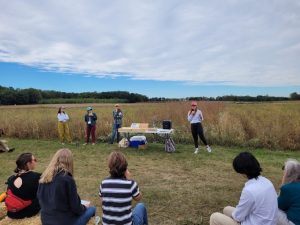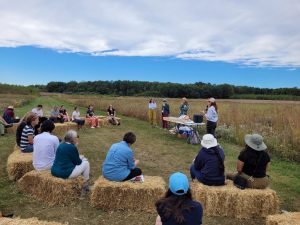Broader impacts, the practical component or long-term goal of most research projects, are often delegated to the final section of a grant proposal, paper or presentation. However, broader impacts are front-and-center to successful research at Michigan State University’s Kellogg Biological Station. The Broader Impacts Fellowship for graduate students at MSU provides funding for outreach, education, and engagement projects that put community first.
Deep roots in agriculture
As a land-grant university, MSU has deep roots with the agricultural community of Michigan. Students working at the research station continue generations of research into management of production systems. Of the many projects at KBS are the Long-term Ecological Research, or LTER, program site, which was established in 1989 and supports research on the effects of continuous agricultural management and other environmental factors on crop production and ecosystem health.
production systems. Of the many projects at KBS are the Long-term Ecological Research, or LTER, program site, which was established in 1989 and supports research on the effects of continuous agricultural management and other environmental factors on crop production and ecosystem health.
In recent years, KBS established the Long-term Agroecosystem Research, or LTAR, program site, which works with farmer stakeholders to study new management practices in a diverse crop system including canola, wheat, corn, soybean, and prairie grasses. Although students conduct research across the station with soil, crop, water, and animals, they are encouraged to participate in engagement efforts that advance their local community as well. Science education and outreach are valuable tools for universities to share research; however, engagement goes beyond these efforts to create reciprocal generation of knowledge and resources for both the community and the university.
Community-engaged scholarship, or “shared learning,” is necessary for bringing together researchers, stakeholders, and community partners to meet local needs. This type of scholarship weaves various forms of knowledge, including individual (lived experiences), local (shared experiences), specialized (interdisciplinary and professional), organization (administrative or strategic thinking), and holistic (value or purpose) (Brown & Lambert 2015). For example, outreach programs would include science education, demonstrations, or the creation of printed publications or resources that include specialized or organizational knowledge. An engaged project would further include affected individuals or parties (individual and local knowledge) in the design and decision-making process of the project and share responsibility among its members in generating and sharing results.
A new fellowship for graduate students
 To support graduate students in their journeys toward engaged scholarship, KBS developed the “Broader Impacts Fellowship.” Students receive project funding or tuition support to conduct 120 hours of engagement work outside their research projects. Past fellows have worked with local schools to assist teachers with lesson plans related to agriculture or sustainable practices, or hosted focus groups with conservation district partners on the value of conservation in rural farming communities. A common barrier to students interested in engagement is locating funding resources or connections to community partners.
To support graduate students in their journeys toward engaged scholarship, KBS developed the “Broader Impacts Fellowship.” Students receive project funding or tuition support to conduct 120 hours of engagement work outside their research projects. Past fellows have worked with local schools to assist teachers with lesson plans related to agriculture or sustainable practices, or hosted focus groups with conservation district partners on the value of conservation in rural farming communities. A common barrier to students interested in engagement is locating funding resources or connections to community partners.
With this fellowship, students are mentored by Misty Klotz and Elizabeth (Liz) Schultheis, education and outreach coordinators for KBS at large and for the KBS LTER, respectively. Misty and Liz are experienced leaders in the KBS community and expertly assist students with advice, support, and organization of their project while providing them room for growth and development in conducting engaged scholarship.
Healthy ecosystems include healthy communities—plant, animal and human alike. By integrating graduate students with the broader community, the KBS Broader Impacts Fellowship assists students with becoming engaged scholars and collaborative learners.
Interested in applying for a KBS Broader Impacts Fellowship? Apply here. MSU also offers many resources on community-engaged scholarship, including workshops and courses for students and faculty.
~~~~~~~~~~~~~~~~~~~~
Cynthia Fiser is a graduate student in Doug Landis’s lab in MSU’s Department of Entomology. Her research looks at the impact of perennial prairie strips on the dispersal of ground beetles in row crop agriculture.
~~~~~~~~~~~~~~~~~~~~
Reference:
- Brown, V. A., & Lambert, J.A. (2015). Transformational learning: Are we all playing the same ‘game’? Journal of Transformative Learning, 3(1), 35-41.
Pictures: Presenting at LTER ASM 2024 on Community-Engaged Research Project (Photo Credit: Nameer Baker)

A legacy of conservation; a commitment to sustainability.
3700 E. Gull Lake Drive
Hickory Corners, MI 49060
(269) 671-5117
info@kbs.msu.edu